Jeep Compass vs Toyota Yaris Cross - Differences and prices compared
Compare performance (213 HP vs 130 HP), boot space and price (34200 £ vs 23700 £) at a glance. Find out which car is the better choice for you – Jeep Compass or Toyota Yaris Cross?
Costs and Efficiency:
Price and efficiency are key factors when choosing a car – and this is often where the real differences emerge.
Toyota Yaris Cross has a decisively advantage in terms of price – it starts at 23700 £, while the Jeep Compass costs 34200 £. That’s a price difference of around 10509 £.
Fuel consumption also shows a difference: Toyota Yaris Cross manages with 4.50 L and is therefore distinct more efficient than the Jeep Compass with 5.80 L. The difference is about 1.30 L per 100 km.
Engine and Performance:
Power, torque and acceleration are the classic benchmarks for car enthusiasts – and here, some clear differences start to show.
When it comes to engine power, the Jeep Compass has a clearly perceptible edge – offering 213 HP compared to 130 HP. That’s roughly 83 HP more horsepower.
In acceleration from 0 to 100 km/h, the Jeep Compass is clearly perceptible quicker – completing the sprint in 8.50 s, while the Toyota Yaris Cross takes 10.70 s. That’s about 2.20 s faster.
In terms of top speed, the Jeep Compass performs slight better – reaching 188 km/h, while the Toyota Yaris Cross tops out at 170 km/h. The difference is around 18 km/h.
Space and Everyday Use:
Beyond pure performance, interior space and usability matter most in daily life. This is where you see which car is more practical and versatile.
Both vehicles offer seating for 5 people.
In curb weight, Toyota Yaris Cross is decisively lighter – 1180 kg compared to 1667 kg. The difference is around 487 kg.
In terms of boot space, the Jeep Compass offers clearly perceptible more room – 550 L compared to 397 L. That’s a difference of about 153 L.
In maximum load capacity, the Jeep Compass performs noticeable better – up to 1561 L, which is about 464 L more than the Toyota Yaris Cross.
Who wins the race?
The Jeep Compass proves to be wins the duel decisively and therefore becomes our DriveDuel Champion!
Jeep Compass is the better all-rounder in this comparison.
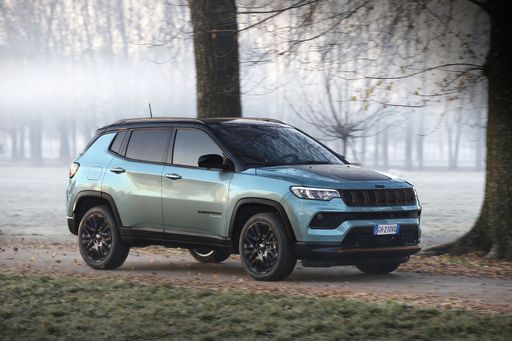
Jeep Compass
Costs and Consumption
View detailed analysis
Engine and Performance
View detailed analysis
Dimensions and Body
View detailed analysis
Jeep Compass
The Jeep Compass packs classic Jeep styling with a surprisingly composed demeanor, equally at home turning heads in the city or tackling a weekend dirt track. Inside it's a pragmatic, user-friendly compact SUV that prioritizes comfort and versatility — a smart pick if you want a dose of adventure without giving up everyday sense.
details
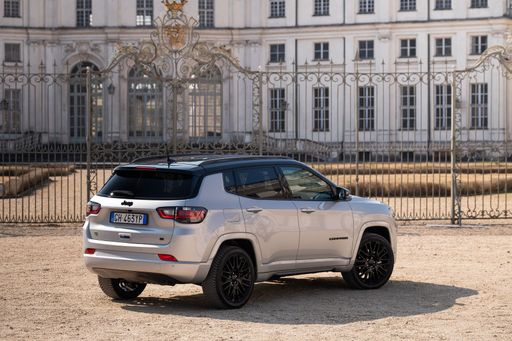
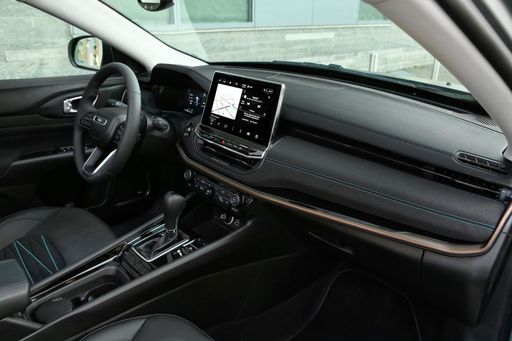
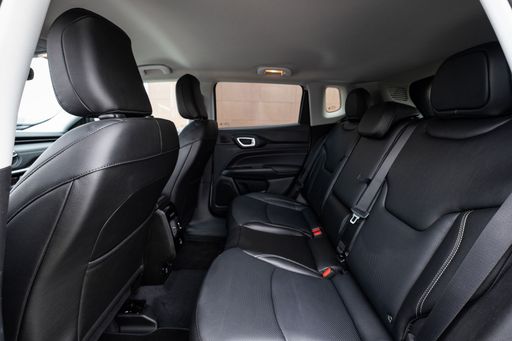
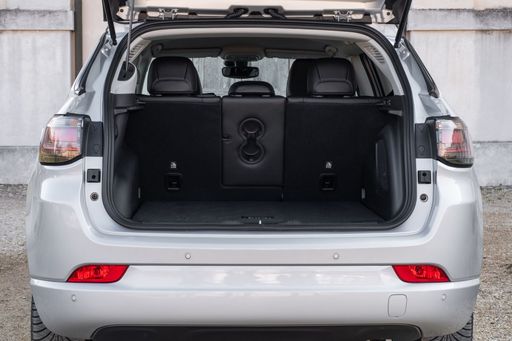
Toyota Yaris Cross
The Toyota Yaris Cross takes the jaunty personality of the Yaris and gives it a taller stance and a bit more practicality, so you get city-friendly agility with added SUV presence. It’s easy to live with, economical on the daily grind, and smartly packaged — a sensible pick for buyers who want fuss-free transport with a touch of character.
details







|

|
|
|
|
Costs and Consumption |
|
|---|---|
|
Price
34200 - 43200 £
|
Price
23700 - 34300 £
|
|
Consumption L/100km
5.80 L
|
Consumption L/100km
4.5 - 4.8 L
|
|
Consumption kWh/100km
17.50 kWh
|
Consumption kWh/100km
-
|
|
Electric Range
500 km
|
Electric Range
-
|
|
Battery Capacity
74 kWh
|
Battery Capacity
-
|
|
co2
0 - 130 g/km
|
co2
101 - 108 g/km
|
|
Fuel tank capacity
55 L
|
Fuel tank capacity
36 L
|
Dimensions and Body |
|
|---|---|
|
Body Type
SUV
|
Body Type
SUV
|
|
Seats
5
|
Seats
5
|
|
Doors
5
|
Doors
5
|
|
Curb weight
1667 - 2198 kg
|
Curb weight
1180 - 1290 kg
|
|
Trunk capacity
550 L
|
Trunk capacity
320 - 397 L
|
|
Length
4552 mm
|
Length
4180 mm
|
|
Width
1928 mm
|
Width
1765 mm
|
|
Height
1675 mm
|
Height
1595 mm
|
|
Max trunk capacity
1561 L
|
Max trunk capacity
1097 L
|
|
Payload
-
|
Payload
485 - 510 kg
|
Engine and Performance |
|
|---|---|
|
Engine Type
Petrol MHEV, Electric
|
Engine Type
Full Hybrid
|
|
Transmission
Automatic
|
Transmission
Automatic
|
|
Transmission Detail
Dual-Clutch Automatic, Reduction Gearbox
|
Transmission Detail
CVT
|
|
Drive Type
Front-Wheel Drive
|
Drive Type
Front-Wheel Drive, All-Wheel Drive
|
|
Power HP
145 - 213 HP
|
Power HP
116 - 130 HP
|
|
Acceleration 0-100km/h
8.5 - 10.3 s
|
Acceleration 0-100km/h
10.7 - 11.3 s
|
|
Max Speed
180 - 188 km/h
|
Max Speed
170 km/h
|
|
Torque
230 - 345 Nm
|
Torque
-
|
|
Number of Cylinders
3
|
Number of Cylinders
3
|
|
Power kW
107 - 157 kW
|
Power kW
85 - 96 kW
|
|
Engine capacity
1199 cm3
|
Engine capacity
1490 cm3
|
General |
|
|---|---|
|
Model Year
2025
|
Model Year
2024 - 2025
|
|
CO2 Efficiency Class
D, A
|
CO2 Efficiency Class
C
|
|
Brand
Jeep
|
Brand
Toyota
|
What drivetrain options does the Jeep Compass have?
The Jeep Compass is available as Front-Wheel Drive.
The prices and data displayed are estimates based on German list prices and may vary by country. This information is not legally binding.
